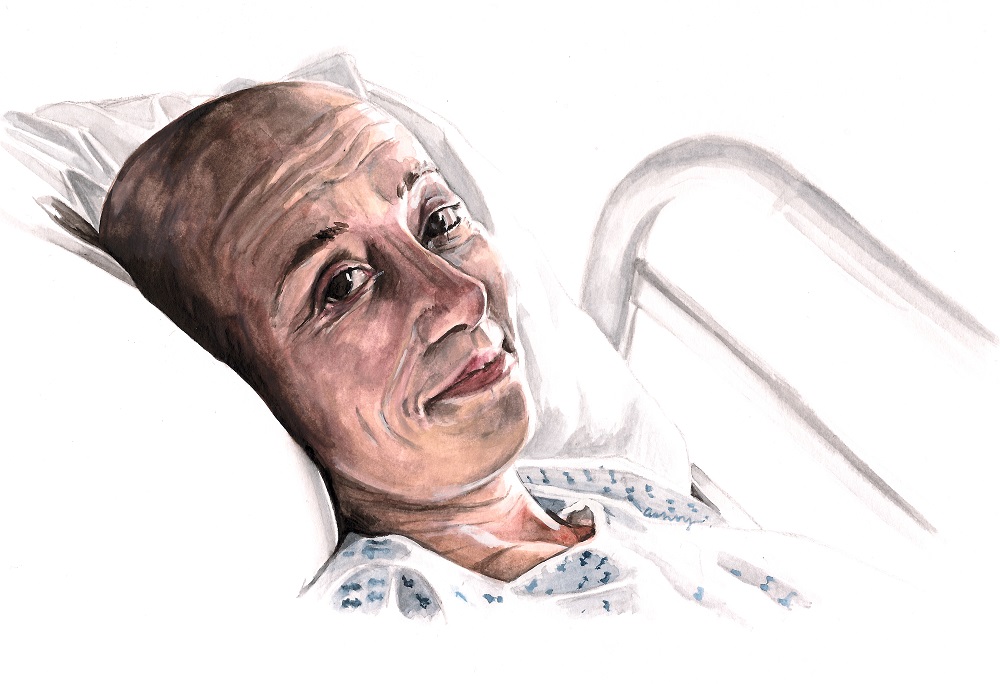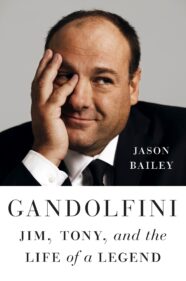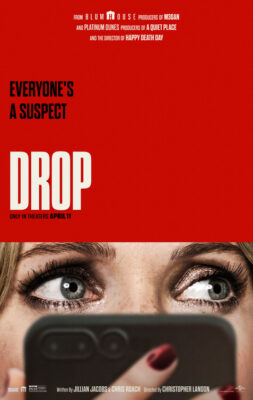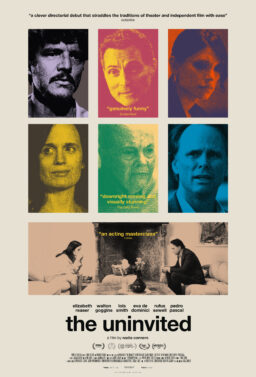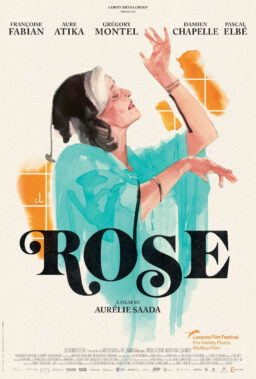The incredibly talented crew at “Bright Wall/Dark Room” begins 2015 by looking at the remarkable career of Mike Nichols. They’ve devoted their entire January issue, out today, to the legendary filmmakers, including essays on “Who’s Afraid of Virginia Woolf?,” “The Graduate,” “Carnal Knowledge,” “Working Girl,” “Angels in America,” “Closer,” and “Wit,” which we’ve excerpted below. Read more excerpts here and you can buy
the magazine on your iPhone and iPad here or sign up for the web-based online
version here. The illustration above is by Brianna Ashby. And make sure to read Roger’s heartbreaking blog post on the film as well.
“I
thought being extremely smart would take care of it. But I see I have been
found out.”
It’s very easy to get lost in our own heads. Some of us do it out of
habit, others boredom; some out of safety, others by necessity. We can be born
that way—genetic wiring bent towards internalization—or have it shaped into us
by early, formative experiences. Either way, by the time we emerge into
adulthood, many of us have learned how to shut things down. To intellectualize
rather than feel. To wall off instead of allow in.
The problem is, sooner or later, the fortress becomes a prison.
Defenses, by way of simple definition, defend against—but overused, they
run the risk of locking us in, becoming a way of taking in the world that
creates a story we’re telling
ourselves, rather than the actual truth of the matter. And then we get attached
to that story, because we’re so sure we need it, so sure that the world is a
much too dangerous place to be open or vulnerable within.
Dr. Vivian Bearing’s favorite defenses—intellectualization and a dry,
sarcastic humor—have served her well in her 48 years. She’s relied on them to
keep herself mostly out of the muck of real, actual human life. She fell in
love with learning and language at an early age (we see her in a flashback from
early childhood, mesmerized by her father’s explanation of “soporific” one
sunlit afternoon) and soon took up residence among them, becoming a doctor of
philosophy and a renowned expert on John Donne’s Holy Sonnets, as well as a famously demanding and uncompromising
professor of 17th century poetry.
Her parents are deceased. She’s never married, and has no children. Instead,
she’s devoted her life to academia, preferring the library to most social
interactions, knowledge to frivolity. She’s been fiercely independent and
driven for as long as she can remember, a rigorous and exacting student of
complex metaphysical poetry. Emotion, vulnerability, humility—these things
simply aren’t a part of Dr. Bearing’s make-up; if grappled with at all, they
must be done so with ironic detachment, intellectual ferocity, and mordant wit.
She observes, analyzes, and remarks drolly on life, rather than ever much
participating in it. Even Donne’s poetry, which she feels “explores mortality
in greater depth than any body of work in the English language,” is something
to be wrestled with cerebrally, an intellectual puzzle to be worked out and
solved.
And then her body—that earthly, messy, corporeal thing she so long took
for granted—breaks down, and everything changes.
“Nothing
but a breath—a comma—separates life from death everlasting. It is very simple,
really.”
We spend most of our lives focused on
just about anything but its inevitable outcome, the one sure thing promised to
us by virtue of being born. Death haunts us from day one, but mostly in the
background: something to be thought of occasionally, then cast aside. One
school of thought posits that the very concept of defense mechanisms—those
myriad internal machinations which work overtime to keep our psyches from
feeling continually overwhelmed—initially developed as a way to help us move
through life on earth as the only species cursed with an awareness of our own
mortality. Which makes a good deal of sense, I guess. When you step back and
try to get any kind of objective lens on it, the fact that each and every one
of us—as well as everyone we’ve ever met, known, or loved—will one day die, is
incredibly horrifying.
(And so we find our many ways to, mostly,
never think about it.)
Mike Nichols’ Wit, however, puts death center stage and never pretends otherwise.
We’re told in its earliest moments, by the main character herself, that she
will spend the film dying: “I have stage-four metastatic ovarian cancer. There
is no stage five.” From that point on, we have no real illusions that Dr.
Vivian Bearing (Emma Thompson) will survive. Wit—co-written by Nichols and Thompson, and based on Margaret
Edson’s Pulitzer Prize-winning play—is not the story of her miraculous recovery
but instead a chronicle of this once well-defended, fiercely proud scholar’s
long, humiliating, and messy capitulation to the cancer that will one day claim
her.
It’s rare to see a film look this
closely—this frankly—at death and dying. To show us steady decline, and a
steadfast grappling with it. To illuminate all the ways a medicalized modern
death robs us, day after day, of our defenses and our dignity. Watching Vivian
Bearing—bald and vomiting and depleted from aggressive chemotherapy, helpless
and humiliated and proud and trying to make sense of it all—is to run right up
against an ancient, awful fear: our body’s resignation to a fate our mind has
always refused to accept, our feeble defenses no match for death’s relentless
march.
“I am, in short, a force.”
At the beginning of the film, Dr.
Kelekian (Christopher Lloyd) tells Vivian that she will need to be tough and
resolute, that she was selected for an experimental course of treatment that
requires nothing less. She knows, from the start, that this aggressive
treatment won’t save or cure her, though it will likely offer invaluable
contributions to medical research. Vivian, long-known for her punctilious
fortitude—and with no family or friends in her life to try and talk her out of
it—agrees. With erudition and wit wrapped around her like armor, she steels
herself against the inevitable horrors of treatment.
As luck would have it, her primary doctor
is a former student of hers, a still-young man who who once took her
metaphysical poetry course as a challenge, and now credits it with helping
sharpen his own rational, intellectual prowess. Dr. Posner (Jonathan Woodward)
is the medical equivalent of Bearing’s academic, a man obsessed with cancer in
all the ways Bearing once was with Donne, approaching it rationally and
studiously, while neglecting its human element and emotional undercurrents. He
treats Vivian’s cancer like a fascinating puzzle, her life as his research, her
body as a text. It’s a taste of her own medicine at the very worst possible
time.
By contrast, she is also under the care
of a compassionate nurse (Susie Monahan), a maternal, warm, and decidedly
unintellectual woman, as well as a fierce advocate for her patients’ humanity.
It doesn’t take long for Vivian to learn to prefer her company to that of
either Dr. Posner or Dr. Kelekian. Vivian’s humanity had been so long denied—by
both herself and others—for so many years, that she’d forgotten how good it can
feel to simply be taken care of, to allow a bit of kindness and compassion into
her life.
Psychoanalyst D.W. Winnicott once
theorized that intellectualization develops as a substitute for mothering, that
an over-preoccupation with logic and knowledge is borne out of a kind of
emotional impoverishment, and becomes a way for one to “mother the self.”
Words, logic, and rational observation take the place of attachment, warmth,
and love. But this trade-off comes at a sizable cost: one is forced to become
an island. And as Donne himself once famously noted, “No man is an island
entire of itself; every man is a piece of the continent, a part of the main.” To forget that, as Vivian did
for large swaths of her life, is to miss out on a good deal of what makes life
worth living.
“It is highly educational. I am learning to suffer…Once I did the teaching,
now I am taught.”
Vivian uses every ounce of her sizable
force, humor, and ferocity to withstand the daily onslaughts to her humanity:
Dr. Posner, awkwardly administering a pelvic exam (“I wish I’d given him an
A”); a team of medical students observing her for their studies (“I feel right
at home, it is just like a graduate seminar”); vomiting endlessly into a basin
she has to offer up for measurement (“If I actually did barf my brains out, it would be a great loss to my
discipline. Of course, not a few of my colleagues would be relieved”).
At first, she finds refuge in these
frequent dry asides—delivered directly to the camera in a continual breaking of
the fourth wall—attempting to maintain a modicum of detached observation over
the awful absurdity of her situation.
But in time, as her situation worsens,
Vivian learns to value simpler things, small acts of human kindness and
connection. Suffering begins to soften her, to open up her heart. Though wit
continues to provide her a sense of strength and solace, so too does an orange
popsicle shared late at night with her nurse, as they talk over the details of
what will happen when her heart finally stops beating.
Even as her intellectual self pokes fun
at such a “maudlin” moment, she is able to realize its ultimate truths:
I can’t believe my life has
become so corny. But it can’t be helped, I don’t see any other way. We are
discussing life and death, and not in the abstract, either. We are discussing
my life and my death. And I can’t conceive of any other tone. Now is not the
time for verbal swordplay. Nothing would be worse than a detailed scholarly
analysis and erudition, interpretation, complication. No, now is the time for simplicity.
Now is the time for, dare I say it, kindness.
As someone who places a great deal of value on my own intellect and an
ability to find humor in most any situation, Wit basically wrecks me. While the coldly rigorous and demanding
parts of Vivian Bearing are almost entirely foreign to me, her defenses, sadly,
are not. I’m in my head constantly, and most at home all by myself. I can get
lost in words and ideas for hours, and far too often use humor as a defense to
both diffuse tension and deflect attention, quite often to the detriment of
truly connecting with those in my personal life. And it’s often tempting to
think that this is enough, this careful distancing, that the world can be
rationalized or analyzed or quipped away, forever kept at an arm’s length. That
there’s a kind of safety in not letting others all the way in.
But Wit strips all that away,
exposing the flaws in such an approach. It deftly illuminates how these types
of defenses and maneuvers only go so far in matters of actual life and
death—they might be valuable tools to have in the bag, but they damn well
better not be the only tools one
brings to the party. Life requires far more vulnerability than that. It
requires openness, authentic engagement, boundless compassion. A willingness to
show up for each other.
“It
came so quickly, after taking so long. There’s not even time for a proper
conclusion.”
When death is finally at hand, Vivian
receives her first and only hospital visitor. E.M. Ashford, her former college
mentor and professor, comes into the room with a bag full of books, on her way
to a birthday party for her great-grandson. Vivian, now reduced to nearly
nothing, sedated by the morphine drip that will lead her into her final hours,
writhes in recognition. Seeing the immense pain her former student is in, the
professor sits down by the bed and attempts to console her.
“Shall I recite something to you, would
you like that?” she asks. “I’ll recite something by Donne.”
“No,” Vivian sputters out, between tears.
And so the wise old professor climbs into
bed with her, cradling her fragile head in her lap, and reads The Runaway Bunny to her instead. It’s
no longer Donne and his tortured sense of salvation anxiety that Vivian wants
or needs—that old intellectual balm has so little to offer to her now. Instead
it’s the primal comfort of an old children’s book—a book which promises that,
in the end, all of us will be found.
‘lf you become a bird and fly away from me,’ said his mother, ‘I will
be a tree that you come home to.’
It’s a moment of intimate simplicity and
grace, a warm and caring mother reading her sickly child to sleep. The entire
world outside her hospital room falls away in that moment. Vivian, at last,
doesn’t need to be her own parent any longer. Steadfastness is no longer
required; the carapace can finally be dropped. Recalcitrance, finally, has
given way to a kind of acceptance.
And we, watching this surrender, feel an
aching swell begin to rise in us, an almost religious sense of redemption and
release. How very complicated we often make the simplest things, how hard we
work to fill the void. How lost we are and how badly we want to be found. How
lonely we walk through this one life we’re given, unnecessarily, and how
wonderful it feels to finally come home.
